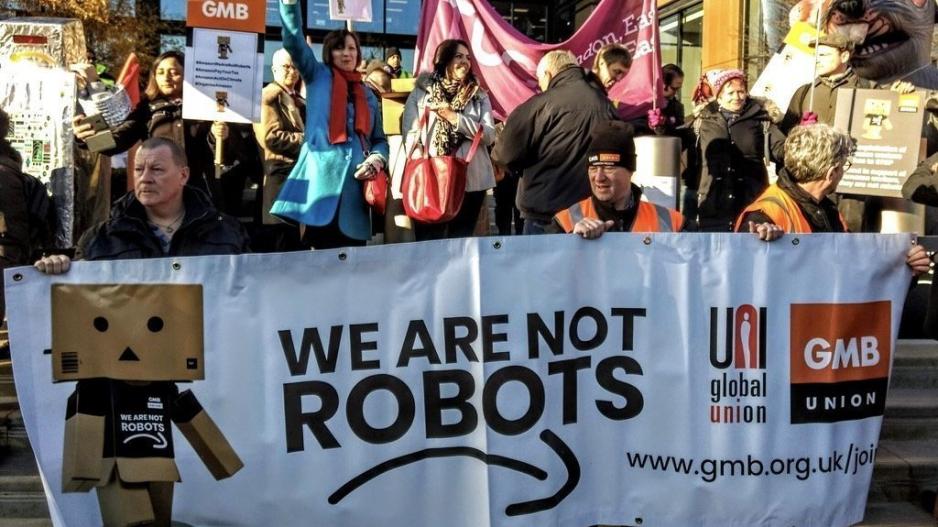Global Warming's Effects on Beer, a Historic Black Friday Strike, and the Passing of a Modest Billionaire
Today's Top Business & Finance Stories Around the Globe
Yesterday, about 4,300 workers at General Motors' automotive plants in Canada initiated a strike. This comes as the auto sector in the US is also seeing similar labor actions, as reported by the Unifor union. This Canadian strike affects three manufacturing facilities in Ontario and was prompted by unsuccessful talks with the company's management. Unifor, representing the Canadian auto workers, emphasized their unmet demands, particularly concerning pension and contract terms.
In response, General Motors expressed their disappointment over the stalled discussions for a new collective agreement. Nevertheless, they highlighted the positive advancements they've made on significant issues in the past weeks.
Last month, Unifor secured a deal with Ford, benefiting 5,600 Canadian employees. This deal, which promised a 15% salary hike over a span of three years, was anticipated to be a benchmark for discussions with General Motors.
In the US, labor developments are evolving too. The United Auto Workers recently announced that around 4,000 Mack Trucks employees have joined an ongoing strike that began in mid-September, which already involves 25,000 workers from the top three US car producers: General Motors, Ford, and Stellantis. The UAW's main demands revolve around better pay, shorter work weeks, improved pension benefits, and enhanced job protections, especially as the industry pivots to electric vehicles.
Highlighting global automotive ties, Mack Trucks, a subsidiary of the Swedish brand Volvo and a truck manufacturer, operates two plants in the eastern US, specifically in Pennsylvania and Maryland.

Climate change is already influencing the taste and quality of beer in Europe and beyond. Recent scientific research published in "Nature Communications" highlights this alarming trend, warning that as climate conditions worsen, these effects on beer will only intensify.
Hops, one of beer's key ingredients, are at the center of these changes. Research indicates that not only is the quantity of hops being affected, but its quality is deteriorating due to global warming. This decline in quality and quantity means brewing beer is becoming increasingly expensive, compelling brewers to adjust their methods.
Researchers forecast that by 2050, hops production in Europe's primary growing areas will decrease by 4% to 18%. Farmers will be tasked with adapting to higher temperatures and drought conditions. Concurrently, the quantity of hops' primary bitter acids, known as Alpha acids, which give beer its characteristic flavor and aroma, will dramatically drop by 20% to 31%.
This decline in hops production is already evident in Europe. Researchers examined average annual hops production from 1971 to 1994 and 1995 to 2018, identifying a significant decline of 0.13 to 0.27 tons per hectare.
Slovenia witnessed the most dramatic drop, with average yields decreasing by 19.4%. Germany, the world's second-largest hops producer, saw an average annual yield decline of 19.1%. The report also detected a decline in the Alpha acids content across all European hops-growing regions.
It's worth noting that beer ranks third in global beverage popularity, following only water and tea.

Charles Finney, co-founder of the Duty Free Stores Group and a startup investor, passed away at the age of 92. He generously dedicated nearly his entire $8 billion fortune to philanthropic causes.
His death was announced by Atlantic Philanthropies, an assembly of foundations he began and funded since the early 1980s. Charles lived modestly in a rented apartment in San Francisco.
In December 2016, he honored his commitment to donate nearly all of his wealth by gifting $7 million to Cornell University.
His biographer noted in the 2007 book titled "The Billionaire Who Wasn’t" that Finney had come to question the ethics of possessing such vast wealth. He chose to retain only about $2 million of his total assets. Frequently, he went to great lengths to remain anonymous after his charitable actions, providing undisclosed funds to universities, medical institutions, scientific endeavors, human rights groups, peace initiatives, and numerous causes across countries like the USA, Vietnam, South Africa, Australia, Israel, Jordan, and more.
Finney’s life was a blend of contrasts. Raised in New Jersey by working-class Roman Catholic parents who faced hardships during the economic downturn, he served in the Air Force. He later studied hotel management and entered the duty-free business, selling liquor, cigarettes, and perfumes to American soldiers returning from Europe in the 1950s.
By the early 1980s, he was drawing tax-free dividends amounting to $35 million annually. At 50, he had lavish homes in New York, London, Paris, Honolulu, San Francisco, Aspen in Colorado, and along the French Riviera.
However, during that decade, he decided to change his lifestyle. He withdrew from the company of the wealthy, opted for economy flights, shopped for clothes at budget stores, and steered clear of upscale restaurants. He sold his limousines and started using public transport or cabs.

Amazon faces the threat of the most significant strike ever to occur during Black Friday, a day marked by a frenzy of transactions. The British union GMB has declared an additional four days of mobilization at Amazon's Coventry warehouse, scheduled for the 7th, 8th, 9th, and also the 24th of November, which is Black Friday. These strikes are the latest in a series of labor actions, disputing wages and union rights.
Rachel Fagan, the GMB organizer of the mobilization, states, "These strike dates will bring the total lost days due to labor action to nearly 30. It's an unprecedented, historic moment when low-paid workers are standing up against one of the world's most powerful companies."
"This is our members' response to Amazon management's refusal to listen," she continues. "Coventry is the heart of Amazon's distribution network. A strike on Black Friday will send shockwaves throughout the company's logistics network in the UK. Amazon must urgently reassess its priorities; otherwise, it's going to cause significant disruption to its customers and the public."
Yesterday, Amazon announced a wage increase for its staff. The minimum starting hourly wage for frontline employees will rise to between £11.80 and £12.50 next week, reaching £13 by April. However, the GMB emphasizes that Amazon needs to do more to address "poverty wages, unsafe working conditions, and workplace surveillance."

The intensifying effects of climate change are increasingly fueling extreme weather events. These events have resulted in approximately $16 million in damages every hour over the past 20 years, according to a recent scientific study. This study marks the first time such global costs have been estimated.
Events such as storms, floods, heatwaves, and droughts have not only cost lives, with thousands of fatalities over the decades, but have also led to extensive property and land destruction. There's a rising trend in the frequency and severity of these incidents due to our changing climate.
From 2000 to 2019, the average annual cost of these disasters was about $140 billion. However, this number varies year to year. Recent data from 2022 suggests that the yearly costs have escalated to around $280 billion.
Yet, these figures might still underestimate the true extent of the damages. Data is often lacking, especially from lower-income nations, and the calculations do not factor in additional climate-related costs like reduced crop yields and rising sea levels.
To arrive at their estimates, the researchers combined data on how global warming amplifies extreme weather events with economic figures related to losses.
Published in the journal Nature Communications, the study also found that roughly 1.2 billion people have been affected by extreme weather due to climate change over two decades.
Two-thirds of the damage costs are attributed to the loss of human lives, while one-third relates to property damage. Storms, such as Hurricane Harvey and Cyclone Nargis, are responsible for two-thirds of the overall climate-related costs, with 16% coming from heatwaves, and 10% from floods and droughts.
The research team believes that their methodology can be used to determine funding for a damage and loss fund established at the 2022 UN Climate Summit. This fund aims to aid poorer countries devastated by extreme weather events. The method can also swiftly estimate the specific costs of individual disasters, facilitating faster financial aid disbursement.
Looking back at the last 20 years, the years with the highest overall climate-related costs were 2003, marked by a European heatwave; 2008, when Cyclone Nargis struck Myanmar; and 2010, which saw a drought in Somalia and a heatwave in Russia. Property damages peaked in 2005 and 2017, with the U.S. facing multiple hurricanes, reflecting the high property values in the country.






